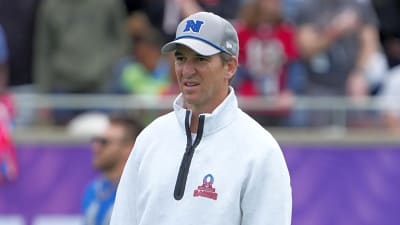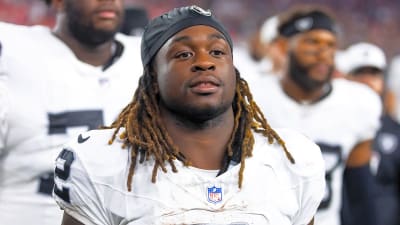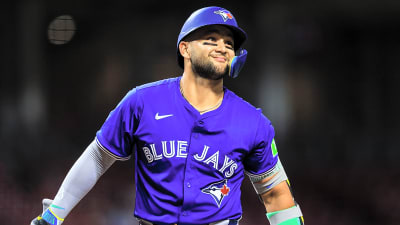
The 2025 MLB Draft is officially in the books, and while teams and fans are still buzzing over this year’s picks, all of us on the Just Baseball MLB Draft team obviously never sleep!
We are already shifting toward the 2026 class, a group LOADED with so much talent from both the college and prep ranks. It’s early, but the foundation of next year’s draft is beginning to take shape, and it’s clear there’s no shortage of intrigue.
Here’s an early look at some of the hitters to know in college baseball for the 2026 MLB Draft cycle.
SS Roch Cholowsky, UCLA
You’ve all heard it by now… Roch Cholowsky as 1.1 for the 2026 MLB Draft?! We published an article earlier in the year that examined Cholowsky, Alabama’s Justin Lebron, and Georgia Tech’s Drew Burress as potential 1.1 candidates. It feels like Roch has solidified himself as the guy for now.
The UCLA shortstop quietly built a case as one of the most well-rounded players in the 2026 MLB Draft class. A catalyst at the top of the Bruins’ lineup, Cholowsky flashes advanced feel at the plate, combining patience with real power.
What’s more, the power surge hasn’t come at the expense of his hit tool; he’s still controlling the zone and hitting with polish well beyond his years. And while the bat pops off the page, his smooth, athletic actions and strong arm at shortstop only raise the ceiling.
Simply put, Roch Cholowsky has put it all together, on both the offensive and defensive side of the ball, solidifying himself as the potential 1.1 for 2026.
Tyler is just going to be posting Roch Cholowsky film this week.
— On The Clock | College Baseball and MLB Draft (@OnTheClock_1) July 3, 2025
Here's his HR from last night's game. Beautiful is an understatement.
True five-tool player you got there, @UCLABaseball! pic.twitter.com/JgqqVsNxP8
SS Justin Lebron, Alabama
We, of course, can’t write a 2026 draft article without mentioning the phenom Justin Lebron! Lebron skyrocketed in 2025, building on an impressive freshman year to establish himself as one of the premier shortstops in the country.
At 6-foot-2, he’s a lean, twitchy athlete with above-average bat speed, a disciplined approach at the plate, and a swing that continues to unlock more power as he matures.
The underlying data backs up that growth, with hard contact becoming a consistent part of his game and suggesting even more pop to come. While he still strikes out more than ideal and could stand to draw a few more walks, the offensive upside is undeniable.
Defensively, Lebron checks every box scouts want in a true shortstop, showcasing elite range, instincts, and the ability to make difficult plays look routine.
With his blend of defensive certainty, athleticism, and rapidly developing power, he profiles as one of the most complete players in the class and a legitimate candidate to be a top-three pick in 2026.
Is Justin Lebron the consensus No. 1 overall pick for the 2026 MLB Draft?! pic.twitter.com/iysHn4x0B6
— On The Clock | College Baseball and MLB Draft (@OnTheClock_1) May 13, 2025
OF Drew Burress, Georgia Tech
Georgia Tech’s Drew Burress emerged as one of the premier bats in college baseball and a clear early contender to go first overall in 2026.
Despite a smaller frame, he pairs elite bat speed with advanced plate discipline, boasting a .366/.485/.794 slash line, more walks than strikeouts, and top-tier underlying metrics, including a 113.5 mph max exit velocity and a 51% hard-hit rate (as of 4/9).
His decision-making is elite, with a 94th percentile chase rate, and he doesn’t sacrifice approach for power. Defensively, Burress projects best in a corner outfield role, but he’s athletic enough to handle center for now and owns an above-average arm.
His offensive consistency and maturity make him one of the safest, most complete hitters in the 2026 class.
Drew Burress when I'm in attendance since last Thursday:
— Tyler Jennings (@TylerJennings24) May 22, 2025
9-for-9, 18 TB, 3 2B, 2 HR, 3 BB, 0 K
I think that's pretty good. Leads off today's game with a 106 EV HR on the second pitch he saw. pic.twitter.com/fnAlEA6kwo
OF AJ Gracia, Duke
Gracia’s 2025 season was the perfect reminder that it’s not about the start, but the finish. After a sluggish first month and a half, he locked in at the plate and became one of the ACC’s most dangerous hitters down the stretch.
Now at Virginia, he’s aiming to cap off an already standout college career. His left-handed swing is as pretty as they come, short and compact with quick hands, smooth bat speed, and a fluid one-handed finish that produces consistent lift.
While his exit velocities dipped a bit this past year, his contact skills remain elite, with an 88% overall rate and 92% in-zone, plus minimal chase.
He can get a little too selective, giving pitchers early advantages, but when he hunts strikes earlier, the offensive ceiling is clear: an above-average hit tool paired with the potential for above-average power.
Defensively, he profiles best in a corner outfield role, with average speed and a fringy arm but solid instincts off the bat. At the end of the day, scouts will be betting on the bat, and it has the makings of something special.
.@DukeBASE's AJ Gracia in April:
— Tyler Jennings (@TylerJennings24) May 1, 2025
.344/.494/.609, 1.103 OPS, 4 HR, 5 2B, 18 BB/7 K
Gracia's timing has improved significantly over the past month, and he's found his rhythm. His average has risen from .196 to .260 as a result.
Still looking like a first-rounder next year. pic.twitter.com/9zRwnM7oP5
3B Chris Hacopian, Texas A&M
Chris Hacopian has steadily risen up draft boards over the past two seasons, and it’s easy to see why. The younger brother of former Maryland star Eddie Hacopian, Chris brings the same intensity and leadership to the field, setting the tone with his energy and competitive edge.
He’s one of the more polished hitters in the 2026 class, posting a 94% contact rate last season while flashing consistent hard contact and the ability to use the whole field. His power has continued to trend up, backed by strong exit velocity data.
Defensively, Hacopian transitioned from third base to shortstop in 2025, where he’s looked comfortable with solid range, instincts, and an average arm. With his all-around game and upward trajectory, Hacopian is shaping up to be a potential top-15 pick in next year’s draft.
Hacopian will put his skills to the test as he transfers from Maryland to Texas A&M in the portal this offseason. He’ll see how he can fare against SEC competition, and if he succeeds, he should be an easy first-rounder.
Chris Hacopian joins the home run party for Maryland. Finishes with a solid bat toss!
— Jared Perkins (@JaredCP1) March 8, 2025
One of the top bats for the 2026 MLB Draft. Incredible bat to ball skills and just all around super polished. He’s having an incredible start to his sophomore campaign. pic.twitter.com/9JSl8POQ3s
OF Chase Brunson, TCU
Chase Brunson out of TCU is an incredibly fun profile. He brings an intriguing blend of strength, feel for contact, and defensive versatility that has steadily gained attention.
He works gap-to-gap with a line-drive swing but has begun flashing pull-side juice, including exit velocities over 110 mph. Though he doesn’t boast elite bat speed, Brunson’s strong hands and barrel control allow him to consistently square up pitches in the zone.
Defensively, Brunson has primarily patrolled center field with dependable reads and body control, but his above-average arm and physical build may ultimately shift him to a corner spot, where his offensive upside could carry a right-field profile.
Chase Brunson leadoff blast!
— Texas College Baseball (@TexasCollegeBSB) April 7, 2024
TCU needs this Sunday dub to avoid the sweep
pic.twitter.com/xlU9O2a0Xq
C Vahn Lackey, Georgia Tech
Catchers with Vahn Lackey’s kind of athleticism are a rare breed, as Tyler discussed on our latest episode of On The Clock. That profile led to a massive breakout in 2025 for Lackey.
Defensively, he’s already regarded as one of the best in the country, explosive out of his crouch, quick with transfers, accurate with a strong arm, and highly mobile laterally.
His blocking skills are advanced, and the overall package draws comparisons to Kyle Teel in his draft year, if not a touch more polished, as Tyler mentioned on the podcast.
At the plate, Lackey’s bat has steadily come along. He’s more hit-over-power at present, showing excellent bat-to-ball ability with an 85% overall contact rate, while posting exit velocities north of 110 mph that suggest more juice is on the way.
His swing can get long, leading to some ground balls, and he chases a bit, but he punishes pitches to the pull side and continues to tap into sneaky power. Add in the fact that he swiped 18 bases last spring, and you’ve got a catcher with legitimate two-way impact.
With continued development, the ceiling is an above-average hitter with average-or-better power at a premium defensive position, and he’s set to play a huge role in 2026.
VAHN LACKEY 3-RUN NUKE!!@LackeyVahn | #WreckHavoc pic.twitter.com/BHLFh9dUSw
— Georgia Tech Baseball (@GTBaseball) June 2, 2024
3B Ace Reese, Mississippi State
Whether Reese would end up back at Mississippi State was a question mark with the new head Coach, Brian O’Connor, and the town, but O’Connor and company were able to keep him in Starkville. Huge for the Bulldogs.
After starting his career at Houston, Reese made the move to the SEC and wasted no time making an impact, putting together a monster sophomore campaign with 21 homers, 18 doubles, and a 1.140 OPS.
A long, physical presence from the left side, he brings easy juice and generates loud bat speed, driving the ball with authority to all fields. The power grades out above average, and he pairs it with better-than-expected contact skills.
Fastballs in the zone don’t stand a chance, as evidenced by his 91% contact rate against them, though his tendency to expand the zone is something to watch.
Defensively, Reese transitioned from the outfield at Houston to third base at Mississippi State. While his actions at the hot corner can be a bit rough, he’s not a liability, and corner outfield remains a fallback option.
With the offensive profile carrying real impact potential, he’s firmly in first-round territory.
The centerpiece of @HailStateBB's offense, Ace Reese led the SEC in batting average (.402) and homers (15) in league play.
— D1Baseball (@d1baseball) May 30, 2025
"Reese boasts one of the highest wRC+ marks in the country at 166, proving he’s not just putting up volume — he’s producing elite value in every at-bat." pic.twitter.com/2TP5tx8sLR
OF Zion Rose, Louisville
Fun. That is the best way to describe Zion Rose’s game on the field. If you want a guy who is going to go all out to make things happen, Rose is your guy.
Bat speed is the name of the game for Rose. He’s got good pull-side pop and utilizes the pull-side more in general, but he can drive the ball the other way and up the middle.
He gets barrel with ease and hits the ball hard as well, posting good average exit velos. It’s a hit-over-power profile, though.
Throughout his time at Louisville, he has consistently demonstrated elite contact rates in-zone and effectively manages his chase and whiff rates. He’s a bit aggressive and doesn’t walk a ton, so he’ll have to keep those going strong if he wants success at the next level.
Since moving to the outfield at Louisville, Rose has shown solid defensive abilities out there. He utilizes his plus-speed to his advantage.
Overall, it is a pretty safe floor-type profile with some room to grow if he can get the ball in the air more and impact the baseball a bit more. It’s a real fun bat that has early-round potential.
BANG‼️ @zionrosebball4 with a missile to the berm‼️
— Louisville Baseball (@LouisvilleBSB) February 26, 2025
B4 | Cards 7, Bulldogs 8
https://t.co/7Ixr1NL1WO#GoCards pic.twitter.com/r8MwJHVteg
More must-reads:
- Angels' Mike Trout in rarefied air after hitting 400th HR
- Mariners' Cal Raleigh makes team history vs. Astros
- The 'Switch-hitter single-season HR leaders' quiz
Breaking News
Trending News
Customize Your Newsletter
 +
+
Get the latest news and rumors, customized to your favorite sports and teams. Emailed daily. Always free!








